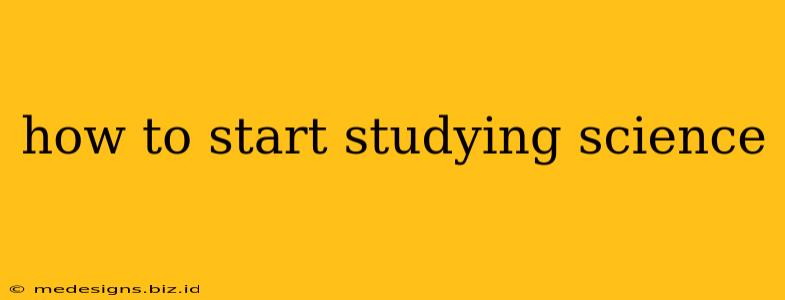So, you're ready to dive into the fascinating world of science! Whether you're a high school student starting a new course, an adult returning to education, or simply someone curious about the universe, this guide will help you begin your science studies effectively. It's never too late to explore the wonders of science.
Choosing Your Scientific Path
The first step is deciding which area of science interests you most. Science is a vast field, encompassing many disciplines. Consider these options:
- Biology: The study of living organisms, from cells to ecosystems.
- Chemistry: The study of matter and its properties.
- Physics: The study of energy, matter, and their interactions.
- Earth Science: The study of Earth's systems, including geology, meteorology, and oceanography.
- Astronomy: The study of celestial objects and the universe.
Don't feel pressured to pick just one! Many scientific fields overlap, and interdisciplinary studies are becoming increasingly common. What initially sparks your interest might lead you down unexpected and exciting paths.
Finding Your Niche:
To help you narrow your focus, ask yourself:
- What are you curious about? Do you wonder how the human body works? Are you fascinated by stars and galaxies? Do you want to understand chemical reactions?
- What are your strengths? Are you good at problem-solving? Do you enjoy working with your hands? Are you detail-oriented?
- What kind of career are you interested in? Many scientific careers require specialized knowledge in a particular area.
Creating a Productive Study Environment
Once you've chosen your focus, creating a conducive study environment is crucial for success.
Essential Elements for Effective Study:
- Dedicated Study Space: Find a quiet, organized area free from distractions.
- Organized Materials: Keep your textbooks, notes, and other materials neatly arranged.
- Time Management: Create a realistic study schedule. Consistency is key! Break down large tasks into smaller, manageable chunks.
- Minimize Distractions: Turn off your phone, close unnecessary tabs on your computer, and let your family or roommates know you need uninterrupted time.
Effective Science Study Techniques
Science requires more than just memorization; it demands understanding and application. Here are some effective techniques:
Active Recall:
Instead of passively rereading your notes, actively try to recall the information without looking. This strengthens memory and identifies areas where you need more focus.
Spaced Repetition:
Review material at increasing intervals. This helps move information from short-term to long-term memory. Use flashcards or spaced repetition software to aid this process.
Practice Problems:
Solve numerous practice problems. This is crucial for mastering scientific concepts and applying your knowledge. Seek out extra problems in your textbook or online resources.
Explain Concepts in Your Own Words:
Teaching or explaining concepts to someone else helps solidify your understanding. Even explaining it to yourself aloud can be beneficial.
Visual Aids:
Utilize diagrams, charts, and other visual aids to understand complex concepts. Creating your own diagrams can be particularly helpful.
Seeking Help and Resources
Don't hesitate to seek help when needed.
Leveraging Available Support:
- Professors and TAs: Utilize office hours to ask questions and get clarification.
- Study Groups: Collaborating with peers can enhance understanding and provide different perspectives.
- Online Resources: Numerous online resources, such as educational websites and videos, can supplement your learning. Khan Academy and Coursera are excellent starting points.
- Textbooks and Supplemental Materials: Your textbook is your primary resource, but don't be afraid to explore additional materials to reinforce your learning.
Starting your journey in science can feel overwhelming, but remember to break it down into manageable steps. By choosing a field that interests you, creating a supportive study environment, and employing effective study techniques, you'll be well on your way to mastering the wonders of science. Good luck, and enjoy the process of discovery!
